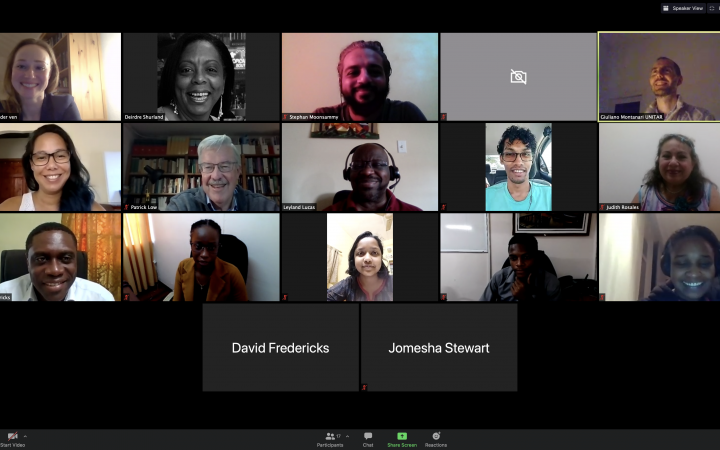12 February 2021, Georgetown, Guyana – What do sugar, cars and economic incentives have in common? They could be ingredients of a green industrial policy to reduce the environmental footprint of Guyana’s transport sector through greater use of biofuels such as ethanol derived from sugar cane. As so often though, the devil is in the details. What policies could be adopted to link economic and environmental considerations? What circumstances call for sector-specific support? How can a government account for international legal frameworks when designing green industrial policies? These are samples of questions discussed at a recent workshop named “Building back better through trade and industrial policy”, organized by the Partnership for Action on Green Economy (PAGE) in Guyana which UNITAR is one of the leading agencies. Tentative answers emerging from the discussions included targeted public investments in infrastructure and technology to improve competitiveness, as well as eco-certification enabling producers to capture price premia in national and international markets. What became quickly clear to participants though, is that these policies require careful deliberation among multiple actors in the public and private sphere due to their systemic nature.
The objective was to build technical knowledge and skills related to the design, implementation and evaluation of public policy at the trade and industry interface, thus supporting local agents in the achievement of national sustainability goals. Key topics and stakeholders of the workshop were identified beforehand together with the Ministry of Foreign Affairs. The sessions were attended by representatives of the Ministry of Agriculture, National Agricultural Research and Extension Institute and the Permanent Mission in Geneva. The training was held virtually in light of the ongoing pandemic.
The organizers were supported by Prof. Leyland Lucas and Dr. Stephan Moonsamy, lecturers at the University of Guyana’s Business School. “Transitioning effectively to a green economy requires the development of courses and capacities that help our students and decision-makers address difficult policy choices. The training will help the Business School to create courses and programmes that enhance learning on these issues, encourage research to provide policy-influencing perspectives and contribute to sustainable development in Guyana” notes Prof. Lucas.
The agenda featured two distinct parts. During the first meeting from 8-10 December 2020, the group discussed concepts and empirical evidence associated with green trade and industrial policy. At a second meeting in January 2021, participants pitched their proposals in response to a number of policy challenges posed by the instructors at the first encounter. “Trade and industrial policy questions are highly complex. One could spend an entire semester only on multilateral frameworks for environmental goods and services. The idea is to build a bridge to local circumstances and problems via the fictitious case studies developed by the participants with the guidance of acclaimed policy practitioners”, states Giuliano Montanari, Focal Point for Guyana at the UN Institute for Training and Research (UNITAR) and co-organizer of the workshop.
The workshop was enriched by the extensive expertise of Colette van der Ven, international trade lawyer and founder of TULIP Consulting, a Geneva-based consulting firm, and Patrick Low, Senior advisor to TULIP Consulting and former Chief Economist of the World Trade Organization (WTO). “As Guyana seeks to develop its economy in a sustainable way, it is imperative that Guyanese policymakers have a clear understanding of different policy instruments that can be employed, and the advantages and disadvantages associated with these instruments” explains Ms. van der Ven.
Aligning environmental and socio-economic objectives is an inherently complex undertaking. Unsurprisingly, while the workshop provided some answers, it also stimulated further questions. By bringing attention to the intricacies inherent to sustainable development, Guyanese government officials will be better equipped as they promote more concrete policy initiatives going forward.


